

The Learning Commons and the Holistic Integration of Information Technology. The purpose of this post is to provide examples of holistic instructional strategies involving information technology in any learning environment.
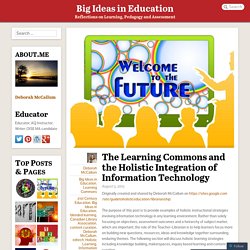
Rather than solely focusing on objectives, assessment outcomes and a heirarchy of subject matter, which are important, the role of the Teacher-Librarian is to help learners focus more on building new questions, resources, ideas and knowledge together surrounding enduring themes. The following section will discuss holistic learning strategies including knowledge building, makerspaces, inquiry based learning and content curation. Holistic Learning in the Learning Commons Librarianship is about providing holistic learning opportunities for all learners. The Learning Commons represents a holistic model of the traditional library.
The purpose of Librarianship goes much deeper than the provision of resources. Please check out this video introducing the Together for Learning document from the Ontario Library Association: How to use the 7 Grandfather Teachings to create classroo... LEARNing Path For Professional 21st Century LEARNing By ICT PracTICE Concept – Education: Digital CitiZENship, CyberSecurity by Gust MEES. WHAT is “Professional LEARNing”!?
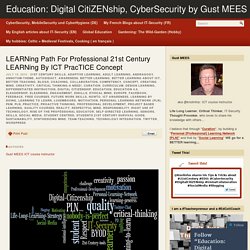
Well, it is DIFFERENT from normal (?) LEARNing as it provides the Students, LEARNers THE “LEARNing Path” and shows THEM THE skills THEY will acquire by a <===> design <===> up from the beginning! This will prepare THEM for <===> Life-Long LEARNing <===> which THEY need after school! It uses ALSO <===> Social Media <===> to stay in contact with people of the same interests and to build UP a <===> PLN (Personal [Professional] LEARNing Network <===> to BUILD UP YOUR <===> PKM (Personal [Professional] Knowledge Management <===>. These “components” will prepare the students, learners for <===> Life-Long LEARNing!
THEY will acquire THE necessary ICT eSkills which THEY need to be prepared for the 21st Century workforce/labour. So, let us have a look on #HowTo design THE <===> Learning Path <===>, please check below.. . Click the above image, please, to access the article. The Trouble with Rubrics (#) March 2006 — vol. 95, no. 4 By Alfie Kohn Once upon a time I vaguely thought of assessment in dichotomous terms: The old approach, which consisted mostly of letter grades, was crude and uninformative, while the new approach, which included things like portfolios and rubrics, was detailed and authentic.
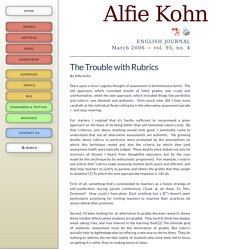
Only much later did I look more carefully at the individual floats rolling by in the alternative assessment parade — and stop cheering. For starters, I realized that it’s hardly sufficient to recommend a given approach on the basis of its being better than old-fashioned report cards. Top 20 psychological principles for teachers – #2 “What students already know affects their learning” This is the second in a series of posts unpicking the Top 20 Principles From Psychology For Pre-k–12 Teaching And Learning.
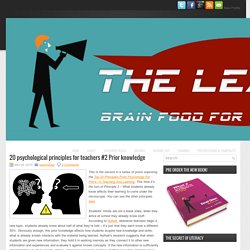
This time it’s the turn of Principle 2 – What students already know affects their learning to come under the microscope. You can see the other principles here. Innisfil Public Library. In case you were unaware, the Lakeshore Branch re-opened this past Thursday.
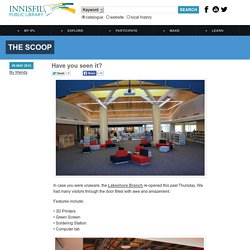
We had many visitors through the door filled with awe and amazement. Features include; Guidelines for Library Services to Persons with Dyslexia – Revised and extended. By Library Services to People with Special Needs & Libraries Serving Persons with Print Disabilities Sections (Joint Project) Introduction The IFLA Guidelines for Library Services to Persons with Dyslexia – Revised and extended – aim to offer guidance to IFLA professional units and all its members worldwide on developing and implementing library services for persons with dyslexia.
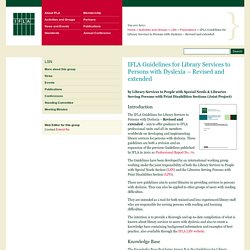
These guidelines are both a revision and an expansion of the previous Guidelines published by IFLA in 2001 as Professional Report No. 70. The Guidelines have been developed by an international working group working under the joint responsibility of both the Library Services to People with Special Needs Section (LSN) and the Libraries Serving Persons with Print Disabilities Section (LPD).
Innovation on Flipboard. Sir Ken Robinson: Creativity Is In Everything, Especially Teaching. From Creative Schools by Ken Robinson and Lou Aronica, published April 21, 2015, by Viking, an imprint of Penguin Publishing Group, a division of Penguin Random House LLC.
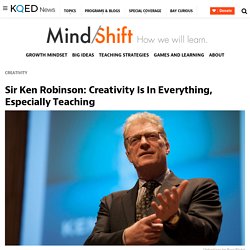
Copyright by Ken Robinson, 2015. Creative Teaching Let me say a few words about creativity. I’ve written a lot about this theme in other publications. Rather than test your patience here with repetition of those ideas, let me refer you to them if you have a special interest. It’s sometimes said that creativity cannot be defined. The 5 Requirements of a Truly Innovative Company. Can you think of any business topic that’s been hotter for longer than innovation?
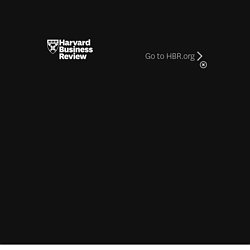
Trouble is, it’s hard to think of any business challenge where real progress has been harder to come by. By now, your company probably has a new business incubator, an idea wiki, a disciplined process for mining customer insights, an awards program for successful innovators, and maybe even an outpost in Silicon Valley—all fine ideas—and yet, most likely, it still struggles to meet its growth goals and seldom thrills its customers. And it’s not just your company. In a McKinsey poll, 94% of the managers surveyed said they were dissatisfied with their company’s innovation performance.
By comparison, think of the long strides many businesses have made in reengineering their supply chains, boosting product quality, and rolling out lean six sigma. Imagine a car motor that lacks a transmission, timing belt, water pump, or starter. What does Curriculum mean to you? #CurriculumIs …. ‘Quiet’? or ‘Conversational’ Classrooms. The term ‘Quiet’ in our traditional school classrooms, often equates to ‘compliance’.
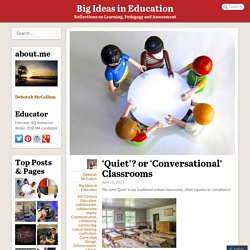
This was very important when our traditional school system was built over 100 years ago. It was essential that we had compliance from our students to adequately train them for the industrial era. When I think of quiet classrooms, I think about the term ‘compliance’. There are obviously times when we need to be quiet to hear the voices of our students, and those times when we need quiet to think independently, or read independently, or meditate, or pause and think. However, it behooves us to consider the implications for the future if our students are required to comply with our demands, versus the implications of allowing classroom to be ‘conversational’ and engaging, at appropriate times. Socrative on Twitter: "Questions to consider while planning #learning activities. Questions to ask while planning planning learning activities. Steps for Cultivating a Love of Reading in Youn... 8 Google search tips for book lovers. A Highlight and Note by Deborah McCallum from The Formative Assessment Action Plan: Practical Steps to More Successful Teaching and Learning.
CBS_DynamicLearning.pdf. Kevin Mowat sur Twitter : "Foundational Pillars of school library as learning commons @keatkin @hleby @infosmarts #learningcommons #WSDTLS. What is the Purpose of Education? Assessment for Learning for Self-Regulation. Classroom scene, student as teacher (Photo credit: Wikipedia) Learning is deeper, more sustainable when students are active participants and responsible for their learning.What better way to do this than to focus on the opportunities that we provide students for learning?
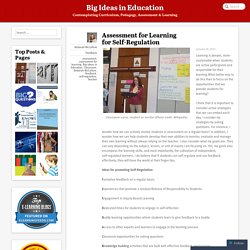
I think that it is important to consider active strategies that we can embed each day. I consider my strategies by asking questions. For instance, I wonder how we can actively involve students in assessment on a regular basis? In addition, I wonder how we can help students develop their own abilities to monitor, evaluate and manage their own learning without always relying on the teacher. Ideas for promoting Self-Regulation: Formative feedback on a regular basis. Experiences that promote a Gradual Release of Responsibility to Students. Curriculum.org sur Twitter : "What is a flipped class? via @Edudemic #edchat #teach #learn...
What Is A Flipped Classroom? Flipped classrooms are becoming more and more common, both for in-person classes and in online learning settings. It’s a great way to shake things up, bring more personalized attention to your classroom, and put some of your technology to use. Flipped classrooms are one of the more popular trends we’ve seen since Edudemic was created, and it is certainly one of the most long- lasting. Other things have come and gone in the past few years, but flipped classrooms are getting even more and more popular. If you’re new to flipped classrooms or have known about the concept for awhile but haven’t made the plunge, the handy infographic below takes a look at some of the basics of flipped classrooms: what are some of the advantages, why and how they work, and how both teachers and students are responding to the flipped classroom model. What Is A Flipped Classroom. Knowledge Building: What is it Really? Isn’t it really just learning by another name?
Guest post by Peter Skillen: I would like to thank Deborah for inviting me to write this guest post about knowledge building. With the frequency that we hear the term these days, it is timely to have some conversation about its origins and intricacies. Twitter. Deborah McCallum sur Twitter : "We hope u will join our #ontTL twitter chat: Thurs Nov 20 @ 8! Support our AQ Candidates! #learningcommons #libchat. Top 10 Steps to a 21st Century Learning Commons. There are important elements that need to be considered when trying to create a 21st Century Learning Commons. Learning Commons in 2014 truly need to be spaces that promote both physical and virtual senses of Safety, Inclusiveness, and Equity. Regardless of your situation, Safety, Inclusiveness, and Equity need to be at the forefront of your planning. AASL_Infographic_FINAL.pdf.
Education: It’s not Rocket Science…. or is it? English: It’s the three basic elements in the learning process (Photo credit: Wikipedia) Education. It’s not Rocket Science…. Right? You just follow the expectations set out by the curriculum, follow along the prescribed chapters from the textbook, read the standardized books, and make sure that all students meet all expectations. The Learning Commons. A hyperlinked experience Inside Curation: Creatively Filtering Content theedublogger.com. Student-Centered Learning: Giving Students a Say » Leading Learning. Knowledge Building in the Learning Commons. Bctla/pub/documents/Points of Inquiry/PlanningSheet.pdf. Bctla/pub/documents/Points of Inquiry/IntermediateInfoLitPlanning.pdf. Bctla/pub/documents/Points of Inquiry/PrimaryInfoLitPlanning.pdf. Bctla/pub/documents/Points of Inquiry/IntermediateCollabPlanning.pdf. Bctla/pub/documents/Points of Inquiry/PrimaryCollabPlanning.pdf. Books Online « Library Learning Commons.
International Children’s Digital Library: A Library for the World’s Children A variety of children’s digital books viewable in several different languages, including English, Chinese, Croatian, German, Portuguese and Arabic. Storyline Online An online streaming video program featuring famous people reading children’s books aloud. Content Curation & Aggregation. Alpha: Computational Knowledge Engine. Librarianship on Pinterest. The Learning Commons. The Virtual Learning Commons Created by David Loertscher and Carol Koechlin - learningcommons. Knowledge Building Centers - learningcommons. Presentations - learningcommons. Wiki With Us / Think Models. The School Library is a knowledge building environment. TED: Ideas worth spreading. Choose the Best Search for Your Information Need.
EasyBib: Free Bibliography Generator - MLA, APA, Chicago citation styles. The Virtual Learning Commons Created by David Loertscher and Carol Koechlin - learningcommons. Apps - iTunes U. Information Literacy Weblog. Libraries without Walls. Welcome! - Jeff Utecht's Presentation Notes.
Virtual Information Inquiry: REACTS Stripling and Pitts Research Process Model. The late 1980s was a time when many librarians and educators were discussing the importance of information skills. Library Success: A Best Practices Wiki - Library Success: A Best Practices Wiki. Teacher Resources. Social Media Basics for Educators. TRAILS: Tool for Real-time Assessment of Information Literacy Skills.
Ebook Search Engine, Free Ebooks, Ebook Price Comparison. ERIC – Information for Librarians. Internet Library for Librarians. Trying To Kill Ourselves With Fun. Ipl2: Information You Can Trust. Forward Arts Foundation. The world's largest reviewer of books, multimedia, and technology for children and teens. Take the Plunge: STREAM By SLJ on October 8, 2017 Leave a Comment Thursday, Nov. 16, 2017, 3PM-4PM ET / 12PM-1PM PT Add an “R,” Reading, to STEAM and ramp up student learning. In this free session, you’ll glean insight from STREAM practitioners and tips on integrating science, technology, reading, engineering, arts, and math.Register Now!
International Association of School Librarianship - IASL. SLA - Welcome to the SLA Website. Web 2.0. Creative Commons Images. Web 2.0. Creative Commons. Educational Resources.